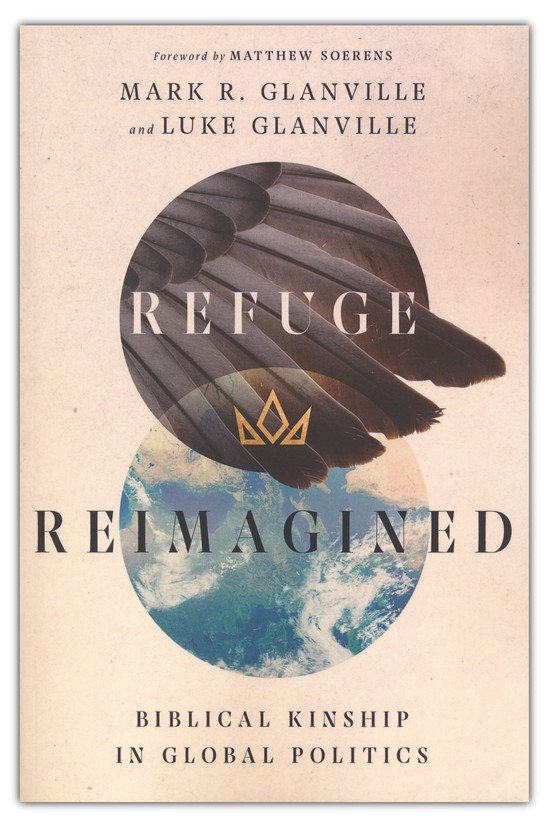We caught up with Mark Glanville and Luke Glanville to talk about their latest book from InterVarsity Press, Refuge Reimagined: Biblical Kinship in Global Politics. In Refuge Reimagined, the two brothers offer a new approach to compassion for displaced people: a biblical ethic of kinship.
In your book, you talk about a “biblical ethic of kinship.” What is that, and why does it matter today?

A biblical ethic of kinship is Scripture’s call for Christ followers to extend solidarity and protection to people experiencing vulnerability. Through the laws and stories of ancient Israel, through the life of Jesus, and from the Pauline Epistles, we learn that God’s people are to enfold people on the margins as make-shift family. There is a constant movement in Scripture of bringing the weakest among us to the center of the community. And these relationships are also profoundly mutual. As we become family together, we are all transformed into the likeness of Christ.
Many of us feel as if the issue of immigration and the refugee crisis are too complex to understand, so we default to “Jesus welcomed everyone.” Why is it imperative that we do our homework and seek to be better educated on issues of immigration/refugees if we are to have an authentic response to questions related to the issue?
Let’s first remind ourselves of Scripture’s relentless call to welcome strangers who are seeking a home. In our book we show that the command to “love” the stranger in Deuteronomy (Deut. 10:18–19) and Leviticus (Lev. 19:34) is covenant language.
The word “love” signals to us that God’s people are to extend covenant solidarity to people on the move, even as Yahweh enfolds the stranger in a covenant relationship (Deut. 10:19). Yet even when we understand this biblical ethic of kinship, challenging questions can linger. We call these the “But what about…” questions: “But what if they are terrorists?” “But what about the economy?” “But what about our jobs?” “But what if they change our culture?”
It is important for Christ followers always to be “ready to give an answer,” both to our faith in Christ and also to the ways in which our faith urges us to respond with tenderness to people who are seeking a home.
What does true ministry with and to refugees look like? What are the key ingredients?
As we engage with refugees and vulnerable immigrants, we must be ready to be formed and blessed ourselves. As we open our hearts to the vulnerability of others, we become aware of our own vulnerability. We become aware of our own need for community and our own need of Christ. The world doesn’t need more saviors from the First World.
The world needs more tenderness—people who are ready to slow down and be transformed in two-way relationships with people on the move. The parable of the sheep and the goats in Matthew 25 shows us that we are not the saviors of the “stranger,” rather in some sense the “stranger” is our savior. For in the stranger we encounter Christ.
Why do you believe that engaging in the immigration and refugee debate/reality is central to the calling of the church?
The church must embrace and embody the tenderness of Christ, for the sake of our witness and for the sake of our own healing. As we embrace Christ’s tenderness, the unprecedented global reality of 82.4 million people being forcibly displaced from their homes will cause us to grieve. We will grieve in solidarity with these sisters and brothers of ours who are seeking a home. Displaying the tenderness of Christ to the world is as crucial for our own healing as it is for our witness.
It is only as we pass on Christ’s tenderness that we truly receive Christ’s healing ourselves. When we offer Christ’s tenderness to a vulnerable people who are seeking a home, then we realize that Christ is also ministering to us in our own brokenness and need. Christ might even be ministering to us through this new friend of ours.
Our organization is called Christians for Social Action. As we think through the refugee crisis today, what are Christians for? And against?
The beginning of Christian witness is to grieve what Christ grieves and to celebrate what Christ celebrates. We need to have the emotional sensitivity of Christ, as Christ himself faces his world. We need to have Christ’s emotional sensitivity both for our local neighborhood and for global realities.
So, we grieve what Christ grieves and celebrate what Christ celebrates in our local neighborhood. And we grieve what Christ grieves and celebrate what Christ celebrates nationally and globally. In our book, we show that Christ grieves forced displacement (e.g., Ruth 2:12; 3:9). And we show that Christ also grieves when communities that have been blessed with land and wealth hoard all of God’s good gifts for themselves (Deut. 15:4). God has given us more than enough to flourish and also to share.
Finally, God is for family, for make-shift family that extends to embrace people who are on the move.
Excerpt from the book:
“Enfolding Asylum Seekers is a Spiritual Issue”
The slowness of evangelical Christians to welcome asylum seekers is puzzling, and yet we shouldn’t leave this social reality unexplored. In our book, Refuge Reimagined: Biblical Kinship in Global Politics, we unfold the clear biblical call to welcome those who are seeking a home. We explore texts such as “God loves the stranger . . . you shall love the stranger” (Deut. 10:18-19), showing that these texts hold out a biblical ethic of kinship. God desires that people-on-the-move be enfolded as family. As well-known as these texts are, all too often Scripture doesn’t seem to impact our attitudes, our heart, our prayers, and our politics when it comes to immigration and refugee issues.
A study by the Pew Research Center in 2018 found that only 51 percent of Americans say that the United States has “a responsibility to accept refugees into the country.” This low percentage may be concerning enough. But consider that the same study found that only 25 percent of white evangelical Protestants say that the United States has such a responsibility—a lower percentage than any other group categorized in the study.
It seems that the challenge before us is, above all, a spiritual one. Scripture’s call to enfold the stranger is an invitation into a knowledge of God—a theological process. And it is an invitation to know God—a spiritual process.
A painting by the Italian master Caravaggio, Madonna di Loreto, provides us with a creative starting point for this spiritual journey. Caravaggio depicts Christ as a baby, held by his mother, Mary, welcoming pilgrims who come to the door—and presumably the door represents the door of the cathedral for which the painting was commissioned. The pilgrims, who appear to be aging and impoverished, kneel before Jesus, drawing close to Christ, their host. Christ is both one who welcomes and one who is in need of welcome here, for the child himself was on the move, first to Bethlehem and then as a fugitive to Egypt. Caravaggio’s painting is an evocative lens for the spiritual challenge before us: Christ as a host, Christ as a stranger. Let’s think about these relationships, one at a time.
God is our host, our welcomer. When this sinks in deeply, it becomes almost impossible to deny welcome to others, not least people seeking a home. We show in our book that the motif of covenant unfolds the character of God as our divine kinsperson who welcomes us and hosts us. Many human families have a kin-keeper, someone who works tirelessly to keep the family connected, to knit it together. God is the divine kin-keeper who adopts those who are in Christ as daughters and sons (Rom. 8:12-17; Gal. 3:23–29). God makes a covenant of kinship with the saints.
God welcomes us. Christ followers are those who share a Father (Matt. 5:9). And like a child with her mother (Ps. 131), we are beloved, upheld, welcomed, comforted, forgiven, lamented, and celebrated. Everything is a gift. This is true uniquely for the church, and yet it is also true for all of humanity, for God has made a covenant with every person and every people group (Gen. 9:8-11).
But how far we have strayed from our identity as created ones: we act so often toward displaced people as if we created the world or (just as foolishly) as if we are the only ones who are beloved. May it not be! May we who are befriended by God, hosted by God, adopted by God, gratefully extend God’s radical welcome to others.
A lesser known biblical-theological reality is that God also makes a covenant with all those who are displaced, people who are seeking a home (Deut. 10:18-19). God is the divine kinsperson of people-on-the-move—read Deuteronomy! As those who serve God, we must welcome those people who God welcomes. We have been welcomed into a house of love in Christ, and so we offer a land, a hearth, a food system, a workplace, a home, a community for those who are displaced.
And yet, as those who might receive refugees or other immigrants to our nation, we are not the only ones offering welcome. True welcome is profoundly mutual, for in the stranger we meet Christ himself. Christ himself teaches this in the parable of the sheep and the goats: “I was a stranger and you welcomed me. . . Truly I tell you, just as you did it to one of the least of these who are members of my family, you did it to me” (Matt. 25:35-36, 40).
Christ is not only our welcomer, but also one in need of welcome. In some early monasteries, when there was a knock at the door, the porter would call out: “I’m coming, Lord!” Christ comes to us as a pilgrim, as the other who is strange to us beyond description. Christ is other to us in his glory as the Son of God. And Christ is other to us as we grasp after privilege, for Christ came not as a glorious divine being but as human, not as a prince but as a peasant, not as an adult but as a newborn, not as one with honor but as one who embraced shame, not as one who rose to the top but as one who was crucified. Christ desires to dwell within us as a stranger, as our God of grace. And so, in the “stranger,” we meet Christ through this person who is like Christ. In one who is in need of welcome, we are reminded of our own dependence, vulnerability, brokenness, and strangeness. When Christ meets us as one who is in need of welcome, we are jolted out of merely offering charity and invited into something mutual and transforming. Our friend Anika Barlow reflects on her work in welcoming refugees at Kinbrace Community Society, Vancouver: “I may have this role of welcomer, but Christ is the welcomer. Someone living next door may be a refugee claimant, but Christ comes as one in need of welcome.” Amen.
As we consider our attitude toward vulnerable people who are seeking a home, the task before us is both theological and spiritual. We come to know God more deeply through studying Scripture—Scripture’s call to enfold people-on-the-move as our kindred is clear. And, we are transformed into the likeness of Christ through prayer and praxis, through personally encountering Christ in people who are seeking a home. Are we ready to respond to this joy-filled, spiritual invitation?
Adapted from Refuge Reimagined: Biblical Kinship in Global Politics by Mark R. Glanville and Luke Glanville. Copyright 2021 by Mark R. Glanville and Luke Glanville. Published by InterVarsity Press, Downers Grove, IL.
Mark R. Glanville (PhD, Bristol University) is associate professor of pastoral theology at Regent College, Vancouver, and an Old Testament scholar. He is the author of Adopting the Stranger as Kindred in Deuteronomy and Freed to Be God’s Family: The Book of Exodus. Luke Glanville (PhD, University of Queensland) is associate professor in the department of international relations at Australian National University. He is the author of Sovereignty and the Responsibility to Protect: A New History, which won the Australian Political Science Association Crisp Prize in 2016 and the CHOICE Outstanding Academic Title Award in 2014.



